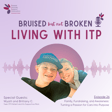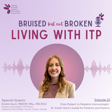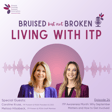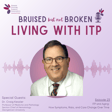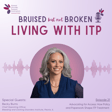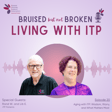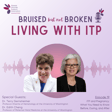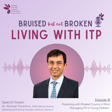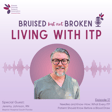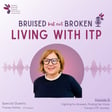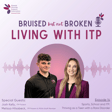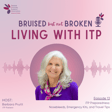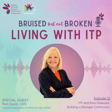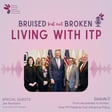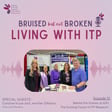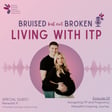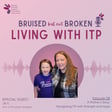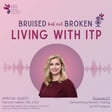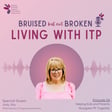Become a Creator today!Start creating today - Share your story with the world!
Start for free
00:00:00
00:00:01

Understanding the Unique Challenges of ITP in Teens
Being a teenager isn't easy. And being diagnosed with ITP can make it even more overwhelming. In this episode of Bruised But Not Broken: Living with ITP, Dr. Michael Tarantino, a leading expert in bleeding disorders, shares what families need to know about diagnosing and managing ITP in teens. From early warning signs to navigating sports, treatment options, school support, and the emotional side of living with a chronic condition, Dr. Tarantino offers expert advice with compassion and clarity. Whether you're a teen, a parent, or a caregiver, this conversation is full of important insights, real-world tips, and hope for the journey ahead.
Transcript
Introduction to the Podcast
00:00:00
Speaker
This is a manageable blood disorder. Everyone's different, so we're going to customize our recommendations and treatment approach to you as an individual.
00:00:11
Speaker
We will do everything we can to make your life less burdened by itp
00:00:26
Speaker
Welcome to the PDSA podcast, Bruised But Not Broken, Living with ITP.
Understanding ITP Diagnosis and Challenges
00:00:31
Speaker
The diagnosis of a bleeding disorder like immune thrombocytopenia may leave you wondering, how can I really live my life with ITP?
00:00:40
Speaker
PDSA's podcast, Bruised But Not Broken, Living with ITP, brings empowering stories, the latest research and treatment updates, lifestyle tips, and answers to the real-life questions the ITP community is asking.
Teenagers and ITP: A Special Focus
00:01:05
Speaker
Well, as we all know, being a teenager is not an easy thing to be, and you don't have a choice in it. But if you're diagnosed with ITP on top of being a teen, can you imagine how difficult it is?
00:01:21
Speaker
Well, Today, we're very lucky because we have Dr. Michael Tarantino joining us, and he is on our medical advisory board at the PDSA.
Expert Insight: Dr. Michael Tarantino's Contributions
00:01:32
Speaker
He's also the chief executive officer and chief medical officer and president of the Bleeding and Clotting Disorder Institute, as well as a professor of pediatrics and medicine at the University of Illinois College of Medicine in Peoria.
00:01:49
Speaker
So we would love to say Welcome to you, Dr. Tarantino. So glad you could join us today. Barbara, thank you. I'm thrilled to be here. You know, ah we've known each other for a long time, and yeah I always love to get together with you and Peter and talk about ITP and PDSA, two things that are very special to me.
00:02:12
Speaker
And very dear to our hearts, isn't it? Absolutely. well Let's start off. Let me
Recognizing ITP Symptoms in Teens
00:02:18
Speaker
ask you some questions. We want to talk about teenagers today and how they and their parents get through this muddy water that they've been that they're faced with. What are some of the first signs or symptoms that typically lead you to diagnose a teenager with ITP?
00:02:36
Speaker
Barbara, that's a great question. You know, the signs and symptoms in children and teenagers are pretty similar, right? We're dealing with two different ages of children, right?
00:02:47
Speaker
ah Their activities are different. And sometimes, you know, an onlooker or a parent may sort of just ah look at a bruise or a red spot and say, well, you know, he's, he or she's an active child and,
00:03:03
Speaker
maybe it's just part of being an active child. But usually the symptoms in ITP are those, but are are magnified tremendously, like a lot of bruises.
00:03:14
Speaker
Bruises in places you wouldn't normally see bruises.
Family Conversations: Addressing Misconceptions
00:03:17
Speaker
And the, not just one little red spot that we refer to as a petechia, but many of those, sometimes hundreds, um especially over areas where there may be more likely trauma, like in the arms and legs,
00:03:30
Speaker
And we'll talk about it later in another podcast when we talk about toddlers, but breath holding, sometimes teenagers do that ah when they when they ah want to get something that they they're not allowed, ah may do that, and you'll see petechiae on the face, ah many of them.
00:03:48
Speaker
So ah things, I guess, the... the take-home message is that bruising and the little red spots that are just unusual for what that child or what that teenager does in their usual day-to-day.
00:04:01
Speaker
Well, I never thought about the holding your breath thing, but I can understand why that would happen. um The pressure with that could cause the petechia. Now, when you are meeting with the parents and the child, the teenager, what is your initial conversation like when you're telling them about this diagnosis?
Gender-Specific Symptoms in Teenage Girls
00:04:20
Speaker
And I mean, I'm sure they're very confused and it feel like information overload. How do you handle that?
00:04:27
Speaker
Oh, for sure. Well, Barbara, let me first let me fill in a gap that I i i i thought of just now that I'm remiss in not telling you with the first question. But in teenagers, especially teenage girls and young women, um their menstrual periods may be heavier than usual.
00:04:44
Speaker
So if it's just unexplained ah that it's a heavier period, that may be the first sign of ITP in a teenage girl or or young woman. The same ah ah for girls and boys, ah young men and women, is ah the more serious type of bleeding. Certainly certainly should be an alarm that it could be a ah disorder like
Communicating Clearly About ITP
00:05:05
Speaker
ITP.
00:05:05
Speaker
So bleeding from the gums or mouth, coughing or spitting up blood, blood in the urine or stool, those are more serious signs of bleeding and those should be addressed promptly. Absolutely.
00:05:16
Speaker
As far as like what the how the conversation goes, the initial conversation. Well, two things, and I and I think the first will sort of be incorporated in some ah some follow up questions, I'm sure that we absolutely include the team in the conversation.
00:05:33
Speaker
Right. Because we want to know as much information from them for a ah variety of reasons. Like ah bleeding symptoms they might not be comfortable telling their parents or just really to get an idea of what their lifestyle is like.
00:05:45
Speaker
And that becomes very important when we design management or treatment strategies. But I often ask the the parents and the teen, like, what have you been told by others, maybe friends or relatives or other practitioners, like an internist ah or a family doctor or a pediatrician?
Dispelling Misconceptions About ITP
00:06:06
Speaker
What have you heard from them? Because many times they will have already heard about the possibility of something at least as serious, maybe be more serious, like leukemia, a form of blood cancer.
00:06:18
Speaker
So it's important to know that upfront because sometimes if parents and the teen have been told that, then whatever I might say might not be heard or digested by them because they're they're preoccupied with this idea that they may have leukemia.
00:06:35
Speaker
So we try to address that first and dispel the notion, especially if we've already then established the diagnosis of ITP. We want to get that leukemia word out of sort of out of their minds if we know that it's not leukemia and we're dealing with ITP.
00:06:51
Speaker
It's really sort of a tutorial on whatever level they feel comfortable with to know that this is a blood disorder. It can lead to some serious consequences in bleeding and that it may be short lived.
00:07:06
Speaker
ah but it may be a longer-term issue. So some of the basic and maybe overarching concepts I like to handle first, but very important to dispel the idea that this is a form of cancer.
Customizing ITP Treatment Plans
00:07:19
Speaker
I think that's such a great point that you're making because when you're asking them, what have you heard so far, what do you know, and what have you Googled probably, you want to make sure they don't have the wrong information.
00:07:32
Speaker
you know so you're really helping them by asking them that. That's a very important question. I don't think I've ever thought about that, but I see the value in it very much.
00:07:43
Speaker
What's the most important thing? I mean, i'm sure their heads are swimming. What is the most important message that you want to convey to this family as they're getting ready to start this journey?
00:07:57
Speaker
Well, a very important message is that this is a manageable blood disorder. Everyone's different, so we're going to customize our recommendations and treatment approach to you as an individual. We're going to take into account everything.
Treatment Options for Teenagers with ITP
00:08:14
Speaker
Everything that you can share with us, everything we know about, treating ITP in teenagers, all of the scientific and and medical information available to us, we'll use that to customize our recommendations for you.
00:08:29
Speaker
ah So I think the message, the real message there is that this is something treatable and that we will do everything we can to make your life less burdened by ITP.
00:08:42
Speaker
That's a nice way to put it. That is. and And there are treatment options there. So you're giving you're giving them hope, which is, I think, so important that, you know, they know that there are treatments and maybe will find the right one for me.
00:08:55
Speaker
Is it difficult to try to figure out which treatment approach to take with each teen? it's Is that a hard thing to figure out?
00:09:06
Speaker
Well, I think the more information we get up front about their lifestyle, the activities they like, their family history, I mean, that's always important. We always want to make sure that there aren't other complicating conditions that may run in a family that maybe just haven't, you know, sort of expressed themselves yet in the teenager.
00:09:28
Speaker
So as much information as we can, we use that to design treatment. Now, you know, treatment for ITP in children, teens, young adults even, really follows sort of a a segmental approach, meaning like when it's first diagnosed, we have some available treatment options that are well-studied, well-accepted.
00:09:51
Speaker
And we go with the one one of those, and it's usually just one therapy in a teenager, the one of those that best suits that teen. So either it's immune globulin, which is an IV infusion over several hours, or it's steroid medicine, which is something that they take by mouth every day for a few weeks or so.
Family History and ITP Treatment Decisions
00:10:14
Speaker
What we call frontline therapy choices are pretty limited, but we we try to choose the dose, the regimen, the duration based on the particular person, the individualized therapy for that team.
00:10:27
Speaker
I also like the point you made about finding out about family. and And in a previous podcast, we've mentioned how important a family history is for genetic purposes and stuff. But you're what you're saying reiterates that. You need to know what runs in the family possibly and what could complicate this disease process. It may not be showing up and it may never show up, but it's good to know that, oh, possibly there might be this issue in the future.
00:11:00
Speaker
That's very interesting. Absolutely. And even beyond that, ah Sometimes, like you sort of alluded, the teen who we think has ITP may have an inherited form of low platelets.
00:11:14
Speaker
And it's really our job as the medical ah community to like sift through that and determine whether this is really ITP which means we have low platelets, the result of the immune system overacting against the platelets, or is it something that the teen has inherited and just hasn't sort of shown itself until now?
00:11:37
Speaker
That certainly can happen. Sometimes there's infections that can be ah in the recent past or currently when the teen is is diagnosed with low platelets and ITP, that ah it could be really related to that infection.
Hopes and Fears: Managing Expectations
00:11:51
Speaker
And many times that will just ah subside as the infection gets ah taken care of by your own body. so So, yeah, it's it's absolutely imperative that we we delve into that and make sure that well we are really dealing with ITP.
00:12:06
Speaker
That's true. and And of course, people are hoping that, oh, it's not ITP, it's something else. But sometimes that something else is more difficult to treat than the ITP. So you just have to see how it plays out as far as the diagnosis.
Sports Safety Guidelines for Teens with ITP
00:12:22
Speaker
I know one of the biggest concerns about with parents when they have a child diagnosed with ITP is how is this going to affect their activities and what are they going to be able to do and what's going to be eliminated from their options of sports and activities that they want to do.
00:12:42
Speaker
So can you talk a little bit about a child or a teenager who has itp that might want to play sports? Is there directions that you kind of follow when talking to them about it and how to go about doing that?
00:12:57
Speaker
Well, there is some direction. And I have to say, Barbara, that thankfully, my wife and I raised three children who at one point in time were teenagers. The approach really has to take a very ah important ah generational and and and ah cultural kind of sensitivity, right?
00:13:19
Speaker
Because I can say ah very easily, you cannot play football. But i I really owe it to that team to understand how important football might be to that person or gymnastics or whatever the activity is.
Protecting Teens from Sports Injuries
00:13:37
Speaker
um I owe it to them to really you know to understand how important it is to them. Because that makes my my ah explanation of things, my rationale or justification for saying you you shouldn't do this, much more sensitive and and also much more pertinent to them.
00:13:55
Speaker
So I think it starts with the premise that if your platelets are low, that could create an extra risk for you when you're injured during a sport to have bleeding complications from it.
00:14:08
Speaker
And i always sort of remind the parents and i present it to the teen that even though we love participating in activities and sports,
00:14:20
Speaker
um For most kids and teens, their brain is what's going to get them a career and a job someday. And we have to protect your brain because a it's still developing at that point in time, and B, it doesn't repair itself very well once it's injured.
00:14:38
Speaker
And especially
Safe Activities and Necessary Precautions
00:14:39
Speaker
if there's a major bleeding inside the brain or or outside the brain in the skull. I mean, that is sort of ah a little bit of a direct approach to the um imperative that contact sports are really not a good idea.
00:14:53
Speaker
and And we don't recommend them. In fact, we won't against them pretty strongly. We want to protect that child's ability to become ah successful, actualized ah adult in their coming years. So we don't want that to be impaired because of a sports injury.
00:15:10
Speaker
um That's very good advice. Yeah. But I think a little more concretely, you we follow a guideline that was produced first in 2006 and then sort of revised in 2016 by the, at the time, called the National Hemophilia Foundation, a foundation that's designed to help people with a related bleeding disorder, not ITP, but another bleeding disorder called hemophilia.
00:15:35
Speaker
and they put out a very nice guideline called playing it safe and it's all about safely participating in the sports that are recommended with caution like for example swimming or cycling or running or fencing or things like that and it's very much the guideline is very much centered around the likelihood of injury ah during the during those activities.
00:16:04
Speaker
Like we know that collision sports, like sports that are designed for collision, like combative sports, for example, like wrestling or boxing, or well, maybe not by intentional design, but it happens always in hockey or in football, right?
00:16:21
Speaker
That those are the sports that we really should avoid if our platelets are low. and And then, well, as you might imagine, there's like this gray zone, right? There's these sports that aren't designed to be collision sports, really don't like have like that weird aspect of hockey where people fight each other at a drop of a hat almost.
00:16:44
Speaker
but ah But injury is pretty common, like in baseball, for example, or in lacrosse or and certainly in soccer, right? So those those sports, we really um have a proceed with caution and we really like to see the the person's platelet count above a certain level.
00:17:04
Speaker
So for contact sports, we really like the platelet count to be essentially normal or at least above 100,000. And for those kind of gray zone sports, between 50 and 100,000 would be okay ah for most of them.
00:17:17
Speaker
The low risk sports like swimming, for example, Now, whenever I say that, I always think, well, what if they clunk their head on the side of the pool and ah right ah direct injury to the head? I
Cycling Risks and Safety Measures
00:17:29
Speaker
mean, I think that happens pretty uncommonly.
00:17:31
Speaker
So the sport itself is pretty low risk. In fact, it's very low risk as far as impact is concerned on the joints and stuff. So we encourage that with the proper supervision, et cetera.
00:17:43
Speaker
As far as sports with wheels, ah like skateboards and bicycles and Whatever else has wheels on it. We usually say you have to participate with the proper equipment.
00:17:56
Speaker
So if you're going to ride a bicycle, you should always wear a helmet. And honestly, if your platelet count is, you know, above 30,000, for example, I think that's okay, ah depending on what kind of bicycling we're talking about.
00:18:10
Speaker
like competitive ah dirt racing, for example, the risk of injury is very high. Riding your bike in you know in the neighborhood, ah just kind of cruising around with your parents or your friends is okay as long as you wear a helmet.
00:18:23
Speaker
um Right.
Involving Teens in Their ITP Care
00:18:24
Speaker
Yeah. I can see where that could be dangerous. I mean, I was told not to ride a bike because of the danger of falling. haven't ridden bike in years. I'd love to ride it again, but I think I'm getting to the age where you need to a tricycle, a three-wheeled one that wouldn't fall over.
00:18:42
Speaker
Well, I know one of the issues I can just picture you in the examining room with the mother and father and a teenager, how do you get the teen to participate in this conversation? i i know how hesitant they can be to speak with adults, especially when adults are talking about them particularly. Yeah.
00:19:06
Speaker
I know you personally are great at this, but just as a ah feeling, a guideline for how does this happen? We want to know. Yeah. Yeah. that's That's a great point.
00:19:18
Speaker
You know, ah years ago ah ah during our teen session at the PDSA annual meeting, the workshop, we focus it exactly on that, that and that issue of communication, especially as it relates to teens.
Promoting Open Dialogue Between Teens and Parents
00:19:34
Speaker
um So we encourage ah the dialogue to happen between the practitioner doctor and the teen. and the parents ah for sort of filling in the blanks and not the opposite, right?
00:19:48
Speaker
Because it's very so it's very tempting for our our parents of teens to wanna give all the details so that they don't miss anything, um that they they want no stone left unturned.
00:20:01
Speaker
And i I can understand that sentiment for sure. But we're really not going to be able to personalize and be precise with treatment unless we hear from the teen.
00:20:12
Speaker
So we try to focus and we even give those ah reminders to the parents that we really want to have ah the conversation primarily with the teen. And do you kick the parents out of the room in order to do that? Or sometimes do you need to how do you handle that if the teen doesn't want to really speak up?
00:20:32
Speaker
Well, yeah, I think that, you know, sometimes it is. for fear of saying things in front of their parents. They don't necessarily want their parents to hear. So, you know, being a pediatrician primarily, ah we we sort of have this method of excusing the the parents for what might be a sensitive topic.
00:20:50
Speaker
um We do tell the teen, look, if if you absolutely don't want us to tell your parents about anything you told us, as long as it's not something that puts your health and life at risk,
00:21:03
Speaker
then we won't we won't tell them. And then I let the parents know that as well. ah Many times, though, the teens will say they just want to say it and not in front of their parents. They like they want their parents to be excused.
00:21:16
Speaker
They'll tell us the information, but then they'll they'll give permission for us to tell the parents that we talked about it. That happens very commonly. They don't want to address that specifically with their parent. they Yeah, or directly, you know, in ah in sort of that, you know, what is often an uncomfortable or awkward situation.
00:21:34
Speaker
So we do try to facilitate that as much as possible, and we will ask the ah parents to to step
Social Workers' Role in Sensitive Discussions
00:21:41
Speaker
out. Now, at our our comprehensive ITP clinic, we have our our social worker kind of tackle some of those more sensitive issues because sometimes, you know, if the teen is ah is a girl or young woman, they might not feel comfortable saying certain things to me as a man.
00:21:58
Speaker
So our social worker often tackles those, and she's wonderful and and very diplomatic about asking the parents to step out while they talk about some sensitive issues.
00:22:08
Speaker
And, you know, I think it's a standard and in pediatric and adolescent medicine clinics. Yeah, I think adolescents has their own challenges, and it sounds like you definitely know how to handle that well.
00:22:21
Speaker
Now,
Predicting ITP Progression in Teens
00:22:22
Speaker
when a teen has been diagnosed with ITP, How does it typically progress or is there anything that's typical about it? And what does like long-term management look like?
00:22:34
Speaker
Yeah, that's a great question because we do have to recognize, even though we don't have precise predictors of what's going to happen with the ITP, many times it behaves like younger children with ITP.
00:22:48
Speaker
And as a rule, you know, 80 to 90% will just resolve spontaneously within a year. But at the same time, many ah teens diagnosed with ITP will sort of behave like adults with ITP.
00:23:03
Speaker
And the rule there is almost the opposite. Most will have a chronic long-term course. So we don't know how that's gonna go at the first encounter. So we do sort of caution.
00:23:17
Speaker
And I have to tell you that that first visit, there's often a lot of information exchanged, right? And if you're like me, probably 10 or 15 minutes of the information is digested and the rest may go over my head or or I may forget it, right?
00:23:33
Speaker
So we do sort of give reminders at the subsequent visits. If we have telephone or or telemedicine encounters, we reiterate that. And if we're in that sort of what we call acute period, that's the first three months of ITP, or even the early next period, which is referred to as persistent ITP,
00:23:52
Speaker
We do remind the the parents and the teen that this may go on for a long time. We're hoping it'll resolve within the year, but it may go on for a long time. And are there any milestones or markers that make you think that it's going to become chronic or is it just a matter of the time, the amount of time that they have been chronic or persist or acute or persistent before they become chronic?
00:24:18
Speaker
Yeah, that's a great question. I wish I had a very precise answer for you, but it's one of the lasting dilemmas in understanding childhood ITP. ah even even Even the same in adults with ITP, it's very difficult to predict. there's no There's no fail-safe mo ah marker that's that ah you know we test for that can tell us, oh yeah, this will absolutely be the short-lived ITP or this will be the long chronic ITP.
Talking About ITP with Others
00:24:47
Speaker
Some people will say that, you know, once kids reach sort of that age of maturity, like after puberty, that they're more likely to have a chronic course than child under under the age of puberty. but But even that's not a perfect predictor.
00:25:03
Speaker
And what do you do you give any advice for how the teens can talk about having ITP? Whether it's to their family, friends, coaches, teachers, what, I mean, is there anything in particular you advise them to share or not?
00:25:22
Speaker
Yeah. Well, again, Barbara, that's like, that's, that really illustrates the importance of knowing the teens, uh, culture, lifestyle, you know, traditions, their generation, because some are, some are willing to open up, uh, to their friends about that kind of thing. And some are not, some are maybe afraid or ashamed and, and some may wear their bruises like a bad, badge a badge of of courage, you know?
00:25:50
Speaker
So, or like a battle that they might wanna show off. And so everyone's a little bit different. So once we really get a good understanding or a good enough understanding of of the child's personality, then we sort of approach the the issue.
Educating Schools About ITP
00:26:08
Speaker
Now we do have a ah team here and i I encourage any clinic that treats ah ah kids or adults with ITP to have an education ah team.
00:26:20
Speaker
that can go out to schools, places of employment, or or talk to the ah supervisors or employers on the phone at least, and really give them sort of the tutorial about ITP.
00:26:33
Speaker
So we do we do probably 75 to 100 in-services a day at schools to talk about our our kids and teens with bleeding disorders, including ITP. And we educate the gym teacher,
00:26:45
Speaker
the the homeroom teacher, if it's a high school kid, the the classroom teachers, the the vice principal, whoever we can round up, but certainly those key people, especially the the gym teachers, to talk to them about exactly what you and I have just talked about, of what it is and what we recommend for restrictions of physical activity.
00:27:07
Speaker
Because gym class is a very interesting phenomenon, right? Sometimes kids walk around the tennis court and ah and that's their gym activity. Sometimes they're playing tennis.
00:27:18
Speaker
Sometimes they're wrestling. Sometimes they're climbing ropes you know it's to some 20-foot height. So we have to make sure that the the school understands what limitations there are based on our recommendations.
Balancing Normalcy and Caution for Teens
00:27:31
Speaker
That's terrific. And because I know ah couple of things, you know, ITP patients don't look sick necessarily. And, you know, this is a disease process that can be very serious at times. And you can look perfectly healthy and normal.
00:27:47
Speaker
And you try to explain it to somebody and they just kind of poo-poo it. It's like, oh, it's just, it's not a big deal. You know, look how good she looks or he looks, you know, how healthy they look. but to really reiterate to the people that are watching them on a daily basis so that they know what to look out for. And i that's really quite terrific, powerful for the patient, especially.
00:28:10
Speaker
And I like the idea that you give these in-service messages opportunities to schools and stuff. That sounds great. Yeah, they I think they're vitally important. You know, we do it before the school year starts.
00:28:22
Speaker
But ah as much as we try to educate about ITP and what the child's and teen's ah restrictions may be, We help formulate a ah game plan if something does happen, like something unforeseen, like falling and hitting their head on and something. We want to make sure that they know how to act, who to call first, what to do in the meantime.
00:28:44
Speaker
ah We want to make sure that the right things are done ah in sort of a more urgent or emergent situation. At the same time, too, we don't them to over restrict the kids because sometimes schools and, you know, I understand where they're coming from.
00:29:00
Speaker
Sometimes they they hear about a diagnosis like ITP and they become overprotective and and restrict the kids even more than we would suggest. And that can be very impactful in a negative way on a teen who may be sort of struggling to stay relevant and stay in the friend group that they might be in.
00:29:20
Speaker
ah sometimes that can get compromised by what happens at school. So we want to make sure that they have every opportunity to to carry on with ah as sort of a quote, normal ah life as as possible.
00:29:34
Speaker
I think that's
PDSA Support for Teens with ITP
00:29:35
Speaker
really important. And because and even in adult life, you want to be normal. You don't want to be different necessarily. And if you can just blend in with the crowd and be happy, I think that's terrific. As long as you know your parameters in life. And that's important to know.
00:29:52
Speaker
I know that the PDSA, patients, teenagers are fortunate with the PDSA because they do have a lot of resources to support teens and their families, including a virtual teen support group, which is really kind of cool where the teenagers can connect with each other and talk about They can talk about anything.
00:30:14
Speaker
You know, it doesn't have to be specifically ITP. There's also educational booklets that the PDSA puts out that you can get for free. And you mentioned it. I think one of the best things, and I've seen this so successful for so many years, is at the ITP conference when you lead a group of just teenagers.
00:30:36
Speaker
And they get to talk to you, and you usually bring one of your nurse practitioners with you or someone to talk to these teens. Because, you know, what's really neat is for the weekend, it's this group of teenagers, they all have ITP.
00:30:53
Speaker
And for that weekend, they're normal because they're all the same. They have, these walls have been broken down. They know what they have. They know kind of a journey that they've been on. And you're so terrific with leading this group and talking to them. I know how appreciative they are as well as their parents.
00:31:12
Speaker
Barbara, thanks for saying that. A few things about that and about all the things you mentioned on a regular basis makes me think, you know where would we be without PDSA in in the ITP community?
00:31:25
Speaker
PDSA has has really transformed ah the potential for especially kids and teens with with ITP, with all of the support, all of the aspects of support, education, community.
00:31:40
Speaker
I'll tell you that the teen workshop at the PDSA annual meeting is a highlight of my year. And one of the big things I can say about it is that it makes me realize how talented these kids are.
00:31:54
Speaker
And how do I know that? ah Because we make the workshop into a project and the project is a vehicle for us to open up discussion. especially when the project involves art of some kind.
00:32:05
Speaker
We have had amazing artists in that group. um So it's ah one one year it was music and we had someone who is in the beginning of their college career for music theory and how talented this young woman was.
00:32:21
Speaker
And all across the board, the kids that are going into science, kids that are going into medicine, ah in one way or another, healthcare care because of their ITP and they just wanna really help the community out.
00:32:33
Speaker
So ah I think fair to say, i get as much or more out of those sessions than the kids that that participate in it. But you're right, it is it is a way for them to sort of really connect in a very unplugged way ah with with their peers.
00:32:51
Speaker
And Kristin Anstead and Kelsey Kuhl and I from from BCDI here in Peoria, we're just the facilitators really to have them feel comfortable opening up and sharing their their journey and their struggles.
00:33:06
Speaker
well and Some great relationships have been formed in this teen group that have lasted for years. And for a lot of the teenagers, they come back year after year because they want to connect again with those good friends that they met. So, I mean, I think that's just a blessing for those children.
Addressing Fatigue in Teens with ITP
00:33:25
Speaker
We did receive some questions from social media. Jada on Instagram asked, is extreme fatigue linked to ITP?
00:33:37
Speaker
Yeah, we have an answer to that question, but we don't have a solution, unfortunately. And right, and I think we really can't talk about ITP in children or especially teens without talking about this fatigue element.
00:33:51
Speaker
So there are there are several theories out there on why it happens. Let me tell you, ah and I think, Barbara, we've already talked about this, at one of the teen sessions at the PDSA meeting a few years ago,
00:34:03
Speaker
We had this format where the teens would be researchers for a day, and they would design a study to address what they thought was the most important thing they wanted solved in ITP, other than obviously curing ITP.
00:34:19
Speaker
And the number one, it was unanimous. They all said fatigue was the number one issue they wanted to be solved. Oh, wow. I think to Jada's question, it's a great question ah that, yeah, it's ah it's a prevalent issue.
00:34:34
Speaker
It affects everyone a little bit differently. I know that some of our colleagues um through the ICON group, the ITP consortium of North America, they looked at this issue of fatigue in children and found it wasn't always related to the platelet count, meaning We would naturally think the lower the platelet count, the more fatigue if this was something really related to ITP.
ITP Relapses and Viral Infections
00:34:58
Speaker
um But it wasn't the case. So we have much more to learn about what causes the fatigue. ah Is it the low platelets or is it something that's ah related to the low platelets, something that's causing the low platelets that could also cause fatigue.
00:35:14
Speaker
And then once we have that better understanding, I think we can really address it better. We have Stephanie asked on Facebook, if you are considered acute and in remission, when you get a virus, say six months later, is there a high risk of having a relapse of the condition, meaning that your platelets could drop again?
00:35:38
Speaker
Yeah, that's a wonderful question too. And that's another one where I'm sorry, I can't really pinpoint the answer to say a specific type of infection or is it true in everybody?
00:35:49
Speaker
ah Because some some of our teens with ITP get virus infections and occasionally their platelet counts actually go up during and after the infection. And sometimes it doesn't. Sometimes it doesn't change and occasionally it'll it'll drop significantly.
00:36:05
Speaker
You know, these past several years with the virus that causes COVID, ah we had this very deep interest in that because it was new to us ah was very it seemed to be very unpredictable.
00:36:18
Speaker
So COVID in some people will cause their ITP to get worse, and in some it doesn't. The vaccine, the same is true for the COVID vaccine. We do know that at least in about 75 patients that were both adults and children,
00:36:34
Speaker
The COVID vaccine really, if it had any effect, it didn't have a lasting effect and was really over by two weeks after the vaccine.
Utilizing PDSA Resources
00:36:42
Speaker
Now, there are certainly some folks out there, adults, some teens out there, i think there are more exceptions to the rule that had their platelet counts drop after the COVID vaccine and and stay down for a prolonged period of time.
00:36:55
Speaker
But I think that's really the exception to the rule. I think also our listeners out there regarding teens need to connect with the PDSA because we do have teen programs at the PDSA. And if you go ahead and email Melissa Hilsebeck, she's pdsa at pdsa.org.
Dr. Tarantino's Gratitude and Support
00:37:17
Speaker
With questions or you want some support, you can call the office and find out when the virtual phone call will be for teens because that would be really empowering for your teenager maybe. If you can't make it to a conference, that might be a great experience for your teenager.
00:37:34
Speaker
Dr. Tarantino, I cannot thank you enough for sharing your wisdom, your experience, and your love for all of us ITP patients, which we can feel for sure.
00:37:44
Speaker
Thank you so much for joining us. And we look forward to talking to you again in the future about another very interesting ITP topic, I'm sure. So thank you.
00:37:56
Speaker
Barbara, thank you. was my pleasure. Anytime you want to chat about ITP, I'm game. I know you are. You're terrific. You're such a great support person for us, our ITP community, as are the other medical advisors in the PDSA. We really appreciate your input and your presence.
00:38:15
Speaker
So thank
Living with a Bleeding Disorder: Daily Challenges
00:38:16
Speaker
you. Thank you.
00:38:24
Speaker
How do you live your life with a bleeding disorder like ITP? From working in the kitchen with knives, to navigating sharp corners in your house, going out to eat in a restaurant, traveling on a plane, attending a sporting event, even dancing at a wedding.
00:38:40
Speaker
ITP patient Barbara Pruitt shares her tips and tricks for moving through life with ITP for more than 60 years. Here's her lifestyle lesson for the day.
00:38:54
Speaker
Little by little, your teenager is growing into a young adult.
Empowering Teens in Medical Decision-Making
00:38:59
Speaker
It's a difficult time for them, as you well know. And it's also a difficult time for you, on top of being a parent of a child with ITP.
00:39:09
Speaker
My advice? Let them participate in their medical care. Allow them to ask questions and find their voice. Up to now, as a parent, you have made all their medical decisions, which is appropriate.
00:39:25
Speaker
And I know it's hard to let that go. Your 13-year-old may not be ready to participate, but your 17-year-old should be part of the conversation.
00:39:37
Speaker
At 18, they are considered adults, and they should feel comfortable making decisions and talking to their physicians and also asking your advice.
00:39:50
Speaker
Assure your child that you will be available. You can even continue to go to their appointments with them. Besides, you are probably a much better historian about their ITP journey anyways.
00:40:03
Speaker
At 18 and 19, one of my parents would always go with me to my hematology appointments. They let me make the decisions, but they were right there for me to ask, what do you think, mom?
00:40:17
Speaker
Or what do you think, dad? Anyways, I know it's always hard to let go. I've been there. But I hope this helps. Think about it. And
Conclusion and Resources
00:40:28
Speaker
until next time, wishing you lots of healthy platelets.
00:40:39
Speaker
Thanks for listening to the PDSA podcast. Bruised but not broken. Living with ITP. Made possible by our presenting sponsor, Amgen.
00:40:50
Speaker
Special thanks to Gus Majorga for composing our theme music.
00:40:56
Speaker
To see what's coming up, visit our website at pdsa.org and subscribe wherever you get your podcasts. Please share this podcast through social media with anyone who you think might benefit from the information and stories we share with the ITP and other platelet disorders community.
00:41:14
Speaker
As always, please speak with a healthcare care professional before making any treatment decisions. But know that PDSA.org is a wealth of information and resources to help you navigate life with ITP and other platelet disorders.
00:41:31
Speaker
Remember, you are not alone.
